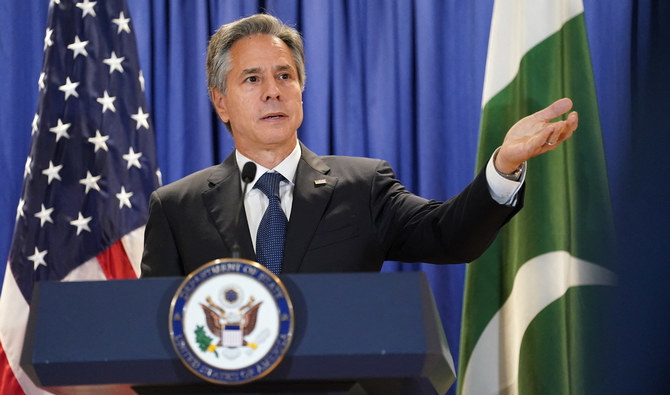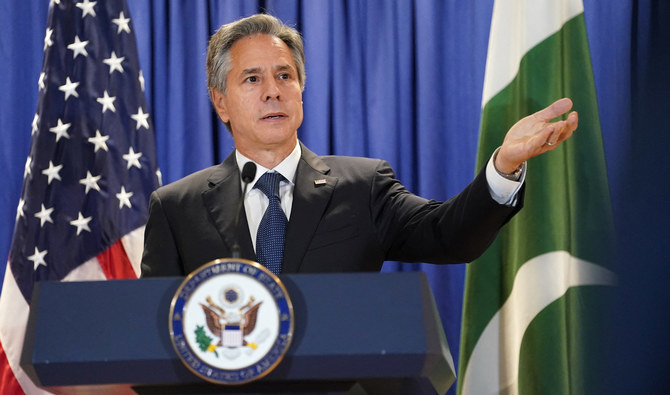In a bipartisan letter to Secretary Blinken, American politicians want their government to build diplomatic pressure on Pakistan
Over 65 members of Congress say protesters in Pakistan should be able to assert their rights in a peaceful and non-violent manner
ISLAMABAD ( Web News )
Over 65 members of US Congress have written a bipartisan letter to Secretary Antony Blinken, announced the Pakistan-American Political Action Committee (PAKPAC) on Thursday, to raise concern over the state of democracy and human rights in Pakistan over the past few months.
While the text of the letter does not explicitly mention the government crackdown on former prime minister Imran Khan’s Pakistan Tehreek-e-Insaf (PTI) party, it asks the administration in Washington to use “diplomatic tools” to push the Pakistani authorities to uphold democratic values, human rights and rule of law.
Pakistan’s coalition administration has periodically arrested PTI leaders since the downfall of Khan’s administration in a parliamentary vote of no-confidence last year in April. The ex-premier attributed his ouster from power to an international conspiracy hatched against him by officials of the Biden administration in Washington, though the US has frequently denied the allegation.
Democrats are concerned about reports that Khan, currently imprisoned and facing a secret trial, potentially faces the death penalty.
Led by Ilhan Omar of Minnesota and Rep. Greg Casar of Texas, the letter expresses “deep concern about the ongoing human rights violations in Pakistan,” which has been in a state of political crisis since the military-engineered removal of former Prime Minister Imran Khan last year. Khan was removed from office following a no-confidence vote organized by the military and his civilian opponents. The Leahy Law, as it’s often called, bars military assistance to government entities engaged in abuse.
According to a classified Pakistani intelligence document reported in August by The Intercept, the effort to remove Khan also came partly on the back of pressure from the U.S. government, which had been antagonized by what State Department diplomats privately called Khan’s “aggressively neutral” stance on the war in Ukraine.
The letter expresses concern over news reports that Khan, currently imprisoned and facing a secret trial, potentially faces the death penalty. Khan faces widely derided charges related to the handling of the cable implicating U.S. involvement in his ouster. The members of Congress urged the State Department to send representatives to monitor the trial of Khan and others under persecution.
“We are unable to ignore the persistent reports of human rights abuses including restrictions on freedom of expression, speech, and religion and belief, as well as enforced disappearances, military courts, and harassment and arrest of political opponents and human rights defenders,” the Democrats write. “These violations not only violate the fundamental rights of the Pakistani people but also undermine the principles of democracy, justice, and rule of law.”
Reps. Cori Bush, André Carson, Joaquin Castro, Lloyd Doggett, Summer Lee, Ted Lieu, Jim McGovern, Frank Pallone, and Dina Titus also signed on.
The crackdown on Khan and his party, highlighted by the letter to the State Department, has entailed widespread arrests, disappearances, torture, and targeted killings of his supporters and Pakistani civil society in general. Citizens of Western countries, including U.S. citizens, have been caught up in this crackdown and imprisoned on allegations of taking part in demonstrations in support of Khan’s party, the Pakistan Tehreek-e-Insaf. “[W]e remain concerned about the ongoing harassment and arrests of political opponents, including members of Pakistan Tehreek-i-Insaf, Pashtun Tahaffuz Movement, and human rights defenders who are charged with bogus cases to trample their right to free speech. Such acts of harassment do not only impact individuals, but deeply traumatize their families. This includes the former Prime Minister Imran Khan,” the letter reads.
The letter’s signatories, particularly Omar, are often accused of expressing concern around human rights abuses only when they are committed by Israel. But her criticism of Pakistan adds to the regular alarm she raises around abuses carried by, for instance, Saudi Arabia and the United Arab Emirates.
The Pakistani military has relied for decades on a steady stream of U.S. security and financial assistance to maintain its privileged place in the country’s ruling establishment. During both the Cold War and the U.S. war on terror, the military has sought to serve as an ally to U.S. security interests even as the two countries have clashed over issues like Pakistani support for the Afghan Taliban. The U.S. government recently helped broker a much-needed bailout from the International Monetary Fund for Pakistan’s government after coming to an agreement to purchase arms for the military for use by the Ukrainian military in its war with Russia.
The possible cessation of this crucial U.S. support could be devastating to the Pakistani military. The country is expected to have elections next year, but Khan, the country’s most popular political leader, has been imprisoned and barred from participation. The letter from Congress targets this lifeline directly, warning that if some semblance of normalcy is not returned to Pakistani politics, along with the participation of Khan himself, the military may be in danger of losing its privileged relationship with the U.S. and the largesse that come along with it.
“We further request that future security assistance be withheld until Pakistan has moved decisively toward the restoration of Constitutional order, including by holding free and fair elections in which all parties are able to participate freely,” the letter reads. “We believe that the United States can play a constructive role in supporting positive change, and it is our hope that our cooperation can contribute to a more just and equitable future for the people of Pakistan.”
“Over the past several months, we have become increasingly concerned by the blanket bans on demonstrations and deaths of several prominent critics of the government,” said the letter. “We ask for your help pressuring the Government of Pakistan to ensure protesters can assert their demands in a peaceful and non-violent way, free from harassment, intimidation, and arbitrary detention.”
“As both Democrats and Republicans who care about the bilateral relationship [with Pakistan], we are concerned that violence and increased political tension could spiral into a deteriorating security situation in Pakistan,” it added.
The members of Congress urged Secretary Blinken to use all diplomatic tools, “including calls, visits, and public statements,” to address the ongoing situation in Pakistan.
“Supporting democracy in Pakistan is in the national interest of the United States,” they maintained.
The PAKPAC commended the Congress members who signed the letters and said Khan’s arrest on corruption charges last week had thrown “the nation into chaos” and brought out “millions to the streets in protests.
“The alarming turn of events has sparked immense concern among the Pakistani-American community,” it said in a statement, “and amplified the urgency for immediate action to protect democratic institutions, independent judiciary, freedom of press and human rights in Pakistan.”
It added the letter to Secretary Blinken highlighted the need for the US “to push Pakistan to curb democratic backsliding while also advocating for robust measures to protect human rights, freedom of speech, press freedom, and the rule of law.”



